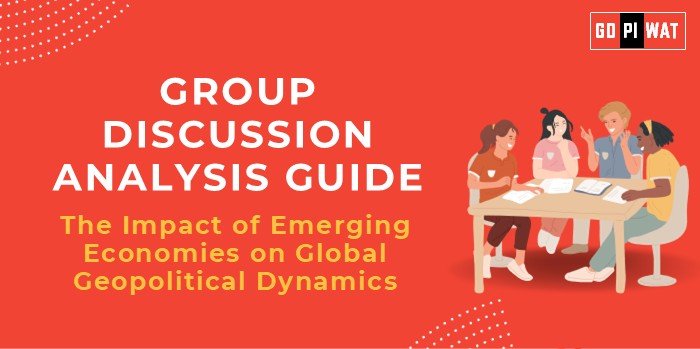📋 Group Discussion Analysis Guide: The Impact of Emerging Economies on Global Geopolitical Dynamics
🌐 Introduction to the Topic
📖 Opening Context
Emerging economies like China, India, and Brazil are reshaping global power dynamics. With their increasing economic clout, these nations influence trade policies, global governance, and multilateral relations.
📜 Topic Background
Since the late 20th century, emerging economies have shifted from peripheral players to central actors in global geopolitics. Organizations like BRICS (Brazil, Russia, India, China, and South Africa) embody this transformation.
📊 Quick Facts and Key Statistics
- 📈 BRICS Contribution: 31.5% of global GDP in PPP terms (2023) – indicative of their economic weight.
- 🌍 Global Trade Impact: Emerging economies accounted for 43% of global exports in 2022.
- 👥 Population Base: 60% of the world’s population resides in emerging economies – a vast labor and consumer market.
- 💰 FDI Inflows: Emerging markets attracted 65% of global FDI in 2022 – showcasing investor confidence.
🤝 Stakeholders and Their Roles
- 🏛️ Governments: Drive policies for global influence and strategic alliances.
- 🌐 Multilateral Organizations: Integrate emerging economies into global frameworks (e.g., WTO, IMF reforms).
- 🏢 Private Sector: Leverage growth in these markets to expand operations.
- 👥 Citizens: Influence through consumer demand and labor force contributions.
🏆 Achievements and Challenges
✨ Achievements
- 🌍 Rise of BRICS: Acts as a counterbalance to Western-led institutions.
- 🌐 China’s Belt and Road Initiative (BRI): Connects over 60 countries.
- 💻 India’s Tech Sector: Exported $200 billion in IT services in 2023, showcasing global integration.
⚠️ Challenges
- 💳 Rising Debt Levels: Nations like Argentina and Turkey face economic strain.
- ⚖️ Political Instability: Recent leadership challenges in Brazil illustrate governance issues.
- 🔄 Global Resistance: Initiatives like the BRI face criticism over perceived debt traps.
🌍 Global Comparisons
- ✅ Success: South Korea transitioned to a developed economy by integrating with global supply chains.
- ⚠️ Challenges: Debt crises in Sub-Saharan Africa highlight pitfalls in over-reliance on emerging markets.
📖 Case Studies
- 🇮🇳 India: Leadership in space exploration and IT services.
- 🇨🇳 China: Dominance in manufacturing and renewable energy.
💡 Structured Arguments for Discussion
- 🛠️ Supporting Stance: “Emerging economies are engines of global growth and innovation, reshaping geopolitical alliances.”
- 🛡️ Opposing Stance: “Their influence is limited by internal challenges like corruption, inequality, and debt.”
- ⚖️ Balanced Perspective: “While emerging economies contribute to growth, their geopolitical influence remains uneven and contingent on reforms.”
🎯 Effective Discussion Approaches
🔑 Opening Approaches
- 📊 Trade Impacts: “43% of global exports originate from emerging economies, highlighting their pivotal role in global trade.”
- 🌐 Alliances: “BRICS exemplifies the growing geopolitical clout of emerging economies.”
⚙️ Counter-Argument Handling
- 🔄 Example: “While debt is a concern, nations like India manage sustainable growth through targeted reforms.”
🧠 Strategic Analysis of Strengths and Weaknesses
SWOT Analysis:
- 💪 Strengths: Vast markets and labor force; increasing technological adoption.
- 🛠️ Weaknesses: Political instability in some regions; dependency on commodity exports.
- 🌟 Opportunities: Leadership in renewable energy; expanded global trade networks.
- ⚠️ Threats: Geopolitical tensions (e.g., US-China trade war); climate change vulnerabilities.
🏫 Connecting with B-School Applications
📚 Real-World Applications
- 🌍 Projects in global trade strategy, renewable energy expansion, and policy analysis.
🎓 Sample Interview Questions
- ❓ “How can emerging economies influence global climate policies?”
- ❓ “Discuss the role of BRICS in global governance.”
💡 Insights for Students
- 📈 Opportunities in consulting for international markets.
- 🌐 Understanding policy frameworks for trade negotiations.


